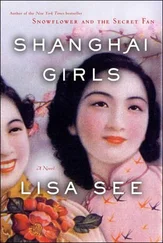Lisa See - Peony in Love
Здесь есть возможность читать онлайн «Lisa See - Peony in Love» весь текст электронной книги совершенно бесплатно (целиком полную версию без сокращений). В некоторых случаях можно слушать аудио, скачать через торрент в формате fb2 и присутствует краткое содержание. Жанр: Старинная литература, на английском языке. Описание произведения, (предисловие) а так же отзывы посетителей доступны на портале библиотеки ЛибКат.
- Название:Peony in Love
- Автор:
- Жанр:
- Год:неизвестен
- ISBN:нет данных
- Рейтинг книги:4 / 5. Голосов: 1
-
Избранное:Добавить в избранное
- Отзывы:
-
Ваша оценка:
- 80
- 1
- 2
- 3
- 4
- 5
Peony in Love: краткое содержание, описание и аннотация
Предлагаем к чтению аннотацию, описание, краткое содержание или предисловие (зависит от того, что написал сам автор книги «Peony in Love»). Если вы не нашли необходимую информацию о книге — напишите в комментариях, мы постараемся отыскать её.
Peony in Love — читать онлайн бесплатно полную книгу (весь текст) целиком
Ниже представлен текст книги, разбитый по страницам. Система сохранения места последней прочитанной страницы, позволяет с удобством читать онлайн бесплатно книгу «Peony in Love», без необходимости каждый раз заново искать на чём Вы остановились. Поставьте закладку, и сможете в любой момент перейти на страницу, на которой закончили чтение.
Интервал:
Закладка:
Then one day the members of the Banana Garden Five came to the tomb to pay their respects. By every measure, they were famous. These five women liked to gather together, go on excursions, and write poetry.
They didn’t burn their manuscripts out of self-doubt or humility. They were published—not by their families as mementos but by commercial publishers who sold their works throughout the country.
For the first time in two years, curiosity drove me from the security of Xiaoqing’s tomb. I followed the women as they strolled Solitary Island’s tree-lined pathways, visited the temples, and sat together in a pavilion to sip tea and eat sunflower seeds. When they boarded their pleasure boat, I joined them, sitting on the deck as it sliced through the water. They laughed and drank wine. They engaged in games, challenging one another to compose poems under the open sky in broad daylight. When their outing was over and they went back to their homes, I stayed with the boat.
The next time they gathered to meet on the lake, I was there, cheating my punishment, ready to go anywhere they wanted.
As a living girl, I’d longed to travel and go on excursions. When I first died, I’d roamed blindly. Now I spent lazy days sitting on the edge of the pleasure boat, listening and learning as we drifted past villas, inns, restaurants, and singsong houses. It seemed the whole world came to my home city. I heard different dialects and saw all manner of people: merchants who paraded their wealth; artists who were immediately recognizable by their brushes, inks, and rolls of silk and paper; and farmers, butchers, and fishermen who came to sell their wares. Everyone wanted either to sell or to buy something: Courtesans with tiny feet and lilting voices sold their private parts to visiting shipbuilders, professional women artists sold their paintings and poems to discriminating collectors, women archers sold their skills as entertainment to salt purveyors, and artisans sold scissors and umbrellas to the wives and daughters of fine families who’d come to my beautiful town for leisure, amusement, and, most of all, fun. West Lake was where legend, myths, and everyday life met, where the natural beauty and quiet of bamboo groves and towering camphor trees smacked up against noisy civilization, where men from the outer realm and women released from the inner realm conversed without a gate, a wall, a screen, or a veil to separate them.
On warm days, many pleasure boats—brightly painted with embroi-
( 2 0 5 )
dered tents on their decks—plied the waters. I saw women lavishly dressed in silk gauze gowns with long trains, gold and jade earrings, and kingfisher-feather headdresses. They stared at us. The women on my boat were not of low repute, new money, or too much money. They were from the gentry, like my mother and aunts. They were great ladies, who shared paper, brushes, and ink. They were modest in what they wore and how they dressed their hair. They inhaled and exhaled words, which floated on the air like willow floss.
The philosophers tell us to detach from the worldly. I couldn’t fix all the wrongs I had done, but the Banana Garden Five helped me to understand that all the longing I felt and all the suffering I’d experienced had ultimately released me from everything material and mundane. But while I was relieved of my burdens, a kind of desperation tinged the Banana Garden Five’s activities. The Manchus had disbanded most men’s poetry clubs, but they hadn’t found the women’s groups yet.
“We’ve got to keep meeting,” Gu Yurei, niece of the brilliant Gu Ruopu, said urgently one day as she poured tea for the others.
“We remain loyalists, but to the Manchus we’re insignificant,” Lin Yining responded, unconcerned. “We’re only women. We can’t bring down the government.”
“But, Sister, we are a worry,” Gu Yurei insisted. “My aunt used to say that the freedom of women writers had more to do with the freedom of their thoughts than the physical location of their bodies.”
“And she inspired all of us,” Lin Yining agreed, gesturing to the others around her, who were unlike the women in my family—who followed the lead dog with smiling faces because they had to—and unlike the lovesick maidens, who’d been brought together by obsession followed by early death. The members of the Banana Garden Five had come together by choice. They didn’t write about butterflies and flowers—those things they could see in their gardens. They wrote about literature, art, politics, and what they saw and did on the outside. Through their written words, they encouraged their husbands and sons to persevere under the new regime.
They bravely explored deep emotions, even when they were grim: the loneliness of a fisherman on a lake, the melancholy of a mother separated from her daughter, the despair of a girl living on the street. They had formed a sisterhood of friendship and writing, and then they built an intellectual and emotional community of women throughout the country through reading. In looking for solace, dignity, and recognition, they ( 2 0 6 )
brought their quest to other women who still lived behind locked gates or were being pushed back inside by the Manchus.
“Why should having children and tending to our homes keep us from thinking about public affairs and the future of our country?” Lin Yining continued. “Marrying and having sons are not a woman’s only way to have dignity.”
“You say this because you wish you were a man,” Gu Yurei teased.
“I was educated by my mother, so how could I wish this?” Yining countered, her fingers trailing in the water, sending quiet ripples across the lake. “And I’m a wife and mother myself. But if I’d been a man, I would have greater success.”
“If we were men,” one of the others cut in, “the Manchus might not let us write or publish at all.”
“All I’m saying is that I also give birth to sons through my writing,”
Yining went on.
I thought about my failed project. Had it not been like a child I was trying to bring into the world to tie me to Ren? I shuddered at this. My love for him had never gone away but only changed, growing deeper like wine fermenting or pickles curing. It bore into me with the pervasiveness of water working its way to the center of a mountain.
Instead of letting my emotions continue to torture me, I began to use them for good. When someone got stuck composing a poem, I helped her.
When Lin Yining began a line like, “I feel a kinship with . . .” I finished with “mists and fog.” New moons could be grand up there beyond the clouds, but they could also move us to melancholy and remind us of our impermanence. Whenever we sank into sorrow, these poets remembered the voices of the lost and desperate women who’d written on walls during the Cataclysm.
“My heart is empty and my life has no value anymore. Each moment a thousand tears,” Gu Yurie recited one day, recalling the poem that seemed to speak the sadness of my existence.
The members of the Banana Garden Five could joke about their relative unimportance to the Manchus, but they were clearly disrupting the moral order. How long would it be before the Manchus, and those who followed them, sent all women—from those who floated on the lake on a warm spring day to those who merely read to expand their hearts—per-manently back to their inner chambers?
( 2 0 7 )

Mother Love
f or th re e year s i was a f ra i d to se e re n. but as th i s year’s Double Seven Festival approached, I found myself thinking about the Weaving Maid and the Cowherd and how all the magpies on earth formed a bridge so they could meet on this one special night. Couldn’t Ren and I also have one night to reunite? I’d learned enough by now; I wouldn’t hurt him. So two days before the Double Seven Festival—and the twelfth anniversary of Ren’s and my first meeting—I left Solitary Island and glided up Wushan Mountain until I came to his home.
Читать дальшеИнтервал:
Закладка:
Похожие книги на «Peony in Love»
Представляем Вашему вниманию похожие книги на «Peony in Love» списком для выбора. Мы отобрали схожую по названию и смыслу литературу в надежде предоставить читателям больше вариантов отыскать новые, интересные, ещё непрочитанные произведения.
Обсуждение, отзывы о книге «Peony in Love» и просто собственные мнения читателей. Оставьте ваши комментарии, напишите, что Вы думаете о произведении, его смысле или главных героях. Укажите что конкретно понравилось, а что нет, и почему Вы так считаете.












